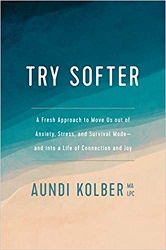
 Try Softer
Try SofterA Fresh Approach to Move Us out of Anxiety, Stress, and Survival Mode – and into a Life of Connection and Joy
Review posted February 11, 2021.
Tyndale Momentum, 2020. 245 pages.
Review written September 21, 2020, from a library book
Starred Review
2020 Sonderbooks Standout:
#5 Christian Nonfiction
I love the idea behind the title of this book. Here’s the author’s explanation from the Introduction, when her therapist supervisor John asked her if she could try softer instead of trying harder:
I’ve got to be honest: At first blush, John’s suggestion didn’t sound like an awesome option – because what did it even mean? All I had ever learned was how to try harder. If I didn’t push, everything would be terrible; everything would fall apart. The suggestion that there could be another way made my body feel tense with anger, a reflection of my twelve-year-old self – a girl riddled with the toxic stress of trying to keep everything together while her home life was constantly imploding. Sure, John, “trying softer” sounds nice, but trying harder is how you survive.
At the same time, I had to face the facts: Trying harder wasn’t really working for me anymore. The strategies I had been using my entire life – hustling, overworking, overthinking, and constantly shifting to accommodate the dysfunction that surrounded me – they had kept me alive, yes, but now they were taking their toll. I felt less in control, not more; worse, not better; weary, not wise. The danger from my past was gone, but the patterns remained – and they were keeping me from being able to be truly present and pay attention to what matters most.
The day that I sat with John in his office totally changed the trajectory of my life because John was right: Pushing isn’t always the answer.
Dear reader, there are truly times when the best, healthiest, most productive thing we can do is not to try harder, but rather to try softer; to compassionately listen to our needs so we can move through pain – and ultimately life – with more gentleness and resilience.
The author does speak as a Christian, but more than that, she speaks as a therapist, so I don’t think you have to be a Christian to appreciate the insights in this book. She tells us her own life story along the way, and weaves in concepts and techniques from therapy.
Toward the beginning, she talks about Big T Trauma and little t trauma and how the patterns we set from dealing with either one of those continue to affect us and are even held in our bodies. She talks about brain science and how both kinds of trauma affect our brains. She talks about attachment theory and how our attachment style affects our relationships. There are exercises to go with every chapter to help you grasp the ideas.
But after the background and the groundwork, the rest of the book is dedicated to practices to help us try softer, to help us be gentler with ourselves. She helps us to pay attention to and value our own bodies and our own emotions, to silence our inner critics, and to learn resilience.
She finishes the book with a prayer for the reader, and the last paragraph gives you an idea of what she’s trying to help you with in this book:
I pray you remember to be gentle with yourself as you grow, knowing condemnation never leads us onward but instead stunts the process. May you courageously continue on and move forward in your own story. And when you are weary, may you never – no, never – lose heart. May you know in an experiential, personal, and transformational way that the One who has called you is faithful.
